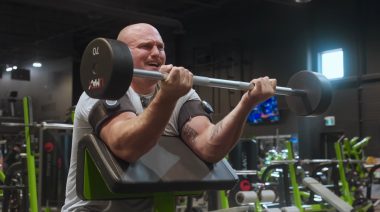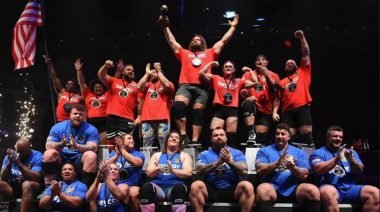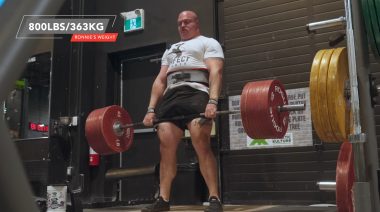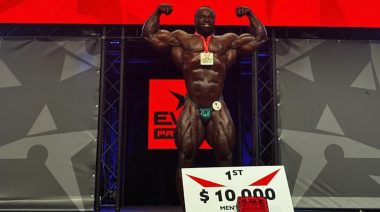Ahead of the 2022 World’s Strongest Man (WSM), strongman Charles “Trey” Mitchell seems prepared to make waves. On April 4, 2022, the American athlete pulled off a unique feat of strength while training when he logged a 183.7-kilogram behind-the-neck press (405 pounds) for three reps. It’s a sizable mark for what some might consider an unconventional variation of the overhead press — a staple of many strongman events.
Check out the complete set in the video below, via Mitchell’s Instagram profile:
View this post on Instagram
[Related: Strongman Oleksii Novikov Is The 2022 Europe’s Strongest Man]
Benefits of the Behind-the-Neck Press
Positioning is the main distinction between the behind-the-neck press and a more traditional overhead press.
In a standard overhead press, a lifter rests the barbell on the front of their shoulders before pressing their weight up. With a behind-the-neck press, they start by resting the barbell near the base of their neck and traps. This positioning requires a lifter to utilize more of their posterior upper body muscles during the press — like their traps, rear shoulders (or deltoids), and upper back.
Lifters seeking improved overhead press stability could consider implementing the behind-the-neck press. This press, if performed correctly, might increase their shoulder range of motion while simultaneously strengthening the muscles loaded during presses.
These specific benefits can also extend to everyday life.
Beyond concrete performance, research shows that people with shoulder issues tend to have worse posture, less range of motion, and weaker overall core stability. (1) By that same token, people who engaged in consistent shoulder stabilization workouts saw significant improvements in shoulder stability and their posture. In some cases, they even lessened any ongoing shoulder pain. (2)
Its potential benefits aside, the behind-the-neck press does not come without pitfalls.
If a lifter has poor shoulder mobility or if the weight’s too heavy, the behind-the-neck press risks potential injury to their shoulder muscles — particularly their rotator cuffs. Plus, due to the awkward positioning of the barbell, a person might hit their head or neck while lowering the weight back down.
Suffice to say that this is an overhead press variation better for people with more experience and with a measure of established shoulder stability and mobility. Someone like Mitchell — who regularly trains overhead presses for strongman competition — certainly qualifies with the necessary experience.
On the Horizon
Mitchell first began competing in professional strongman competitions in March of 2016. As he continues to plug away with his overhead presses, here are some of the 29-year-old’s more notable strongman results over the years:
- 2017 Official Strongman Games — 1st overall | First career victory
- 2018 Giants Live North American Open — 2nd overall
- 2018 America’s Strongest Man — 1st overall
- 2021 WSM — 4th overall
- 2021 Shaw Classic — 1st overall
- 2021 Arnold UK — 3rd overall
The 2021 WSM was the second time Mitchell was able to qualify for the Finals during his career. In rising from eighth place to fourth overall, he saw a massive improvement upon his first Finals berth two years prior. If Mitchell can replicate a similar rise during this year’s event, he might notch his first-ever WSM title.
The 2022 WSM will occur on May 24-29, 2022, in Sacramento, California, where Mitchell is already a confirmed participant. Only time will tell whether his behind-the-neck press power in training pays off with a win.
References:
- Radwan, A., et al. (2014). Is there a relation between shoulder dysfunction and core instability? International Journal of Sports Physical Therapy; 2014 Feb; Vol. 9 (1)
- Kim, EK., Kang, J.H., Lee, H.T. (2016). The effect of the shoulder stability exercise using resistant vibration stimulus on forward head posture and muscle activity. The Journal of Physical Therapy Science. 2016 Nov; Vol. 28 (1)
Featured image: @berserkerlifter on Instagram






